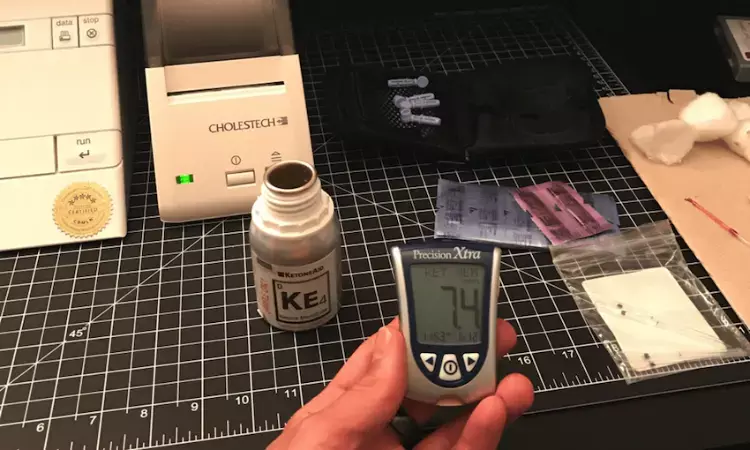- Home
- Medical news & Guidelines
- Anesthesiology
- Cardiology and CTVS
- Critical Care
- Dentistry
- Dermatology
- Diabetes and Endocrinology
- ENT
- Gastroenterology
- Medicine
- Nephrology
- Neurology
- Obstretics-Gynaecology
- Oncology
- Ophthalmology
- Orthopaedics
- Pediatrics-Neonatology
- Psychiatry
- Pulmonology
- Radiology
- Surgery
- Urology
- Laboratory Medicine
- Diet
- Nursing
- Paramedical
- Physiotherapy
- Health news
- Fact Check
- Bone Health Fact Check
- Brain Health Fact Check
- Cancer Related Fact Check
- Child Care Fact Check
- Dental and oral health fact check
- Diabetes and metabolic health fact check
- Diet and Nutrition Fact Check
- Eye and ENT Care Fact Check
- Fitness fact check
- Gut health fact check
- Heart health fact check
- Kidney health fact check
- Medical education fact check
- Men's health fact check
- Respiratory fact check
- Skin and hair care fact check
- Vaccine and Immunization fact check
- Women's health fact check
- AYUSH
- State News
- Andaman and Nicobar Islands
- Andhra Pradesh
- Arunachal Pradesh
- Assam
- Bihar
- Chandigarh
- Chattisgarh
- Dadra and Nagar Haveli
- Daman and Diu
- Delhi
- Goa
- Gujarat
- Haryana
- Himachal Pradesh
- Jammu & Kashmir
- Jharkhand
- Karnataka
- Kerala
- Ladakh
- Lakshadweep
- Madhya Pradesh
- Maharashtra
- Manipur
- Meghalaya
- Mizoram
- Nagaland
- Odisha
- Puducherry
- Punjab
- Rajasthan
- Sikkim
- Tamil Nadu
- Telangana
- Tripura
- Uttar Pradesh
- Uttrakhand
- West Bengal
- Medical Education
- Industry
Premeal Ketone drink improves blood sugar and vascular health in obese adults: Study

Postprandial hyperglycemia increases systemic inflammation and is a risk factor for cardiovascular disease. A recent study suggests Adults with obesity show improvements in blood sugar response and endothelial function after a 14-day intervention with a ketone monoester drink consumed before each meal. The study findings were published in The Journal of Clinical Endocrinology & Metabolism on 26 December 2020.
A ketone monoester (KME) drink containing β-hydroxybutyrate (β-OHB) rapidly lowers blood sugar, which may be a strategy protecting against postprandial hyperglycemia. Currently, there is considerable interest in ketone metabolism owing to recently reported benefits of ketosis for human health. Traditionally, ketosis has been achieved by following a high-fat, low-carbohydrate "ketogenic" diet, but adherence to such diets can be difficult. An alternative way to increase blood D-β-hydroxybutyrate (D-βHB) concentrations is ketone drinks, but the metabolic and endothelial effects of exogenous ketones are relatively unclear. Therefore, researchers conducted a study to evaluate whether KME would attenuate 2-hour postprandial glucose, lower systemic inflammation, and improve vascular function in adults with obesity.
It was a randomized, crossover, double-blinded cohort study in 14 participants with obesity. They were randomly assigned to receive either KME (12 g β-OHB) or placebo 15-minutes prior to each meal for 14-days with all meals provided. Researchers assessed the postprandial glucose by continues Glucose monitoring. They also evaluated the vascular function and inflammation before and after treatment periods.
Key findings of the study were:
♦ Researchers noted that the postprandial blood sugar was 8.0% lower in KME when compared with placebo and 24-hour average glucose reduced by 7.8%.
♦ They observed that the brachial artery flow-mediated dilation increased from 6.2±1.5% to 8.9±3.3% in KME with no changes in placebo.
♦ They found no changes in plasma cytokines; however, LPS-stimulated monocyte caspase-1 activation was lower following KME supplementation versus placebo.
♦ They noted ketone supplement was well tolerated by participants and adherence was high.
The authors concluded, "In adults with obesity, 14-days of pre-meal KME supplementation improves glucose control, enhances vascular function, and may reduce cellular inflammation. KME supplementation may be a viable, non-pharmacological approach to improving and protecting vascular health in people with heightened cardiometabolic risk".
For further information:
Dr Kartikeya Kohli is an Internal Medicine Consultant at Sitaram Bhartia Hospital in Delhi with super speciality training in Nephrology. He has worked with various eminent hospitals like Indraprastha Apollo Hospital, Sir Gangaram Hospital. He holds an MBBS from Kasturba Medical College Manipal, DNB Internal Medicine, Post Graduate Diploma in Clinical Research and Business Development, Fellow DNB Nephrology, MRCP and ECFMG Certification. He has been closely associated with India Medical Association South Delhi Branch and Delhi Medical Association and has been organising continuing medical education programs on their behalf from time to time. Further he has been contributing medical articles for their newsletters as well. He is also associated with electronic media and TV for conduction and presentation of health programs. He has been associated with Medical Dialogues for last 3 years and contributing articles on regular basis.
Dr Kamal Kant Kohli-MBBS, DTCD- a chest specialist with more than 30 years of practice and a flair for writing clinical articles, Dr Kamal Kant Kohli joined Medical Dialogues as a Chief Editor of Medical News. Besides writing articles, as an editor, he proofreads and verifies all the medical content published on Medical Dialogues including those coming from journals, studies,medical conferences,guidelines etc. Email: drkohli@medicaldialogues.in. Contact no. 011-43720751


